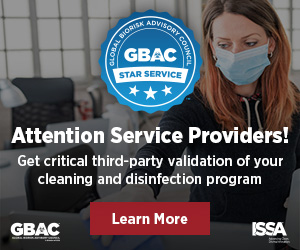Articles
Partnerships: Stretching For Success
Categories: Management
By Kevin Keeler | April 17, 2018 << Back to Articles
Accessible by: anyone
Let’s face it—sometimes you need some help to keep your operation running smoothly. Since you can’t do every little thing on your own, cultivating the right relationships with distributors and other key industry partners is critical to your success as a facility service provider.
When I was younger, I always thought I was smarter than everyone. I later discovered that quite a lot of people feel the same way about themselves. Many of us are wired to be competitive and, in the quest for winning, we often neglect the most important resource for achievement: the right partner. I am not talking here about a partner in the traditional sense—someone who shares your business and your profits—though that can be one form of useful partnership. I am talking about any resource, from software to people, that helps your business grow and run more efficiently.
Why you need partners
My mother used to say, “You are either green and growing, or ripe and rotting.” The nature of the world is that everything changes. It is the same for us personally, professionally, and for the organizations that we work for or own. Things are either expanding or contracting or, in some cases, staying stagnant; the partners you choose will vary depending on the circumstances.
The pace of change in the cleaning industry makes it virtually impossible for one person to be competent in all the skills necessary to run a successful and growing operation. Adding more employees is not the only answer. Software, professional organizations, and consultants are also some partners that can help your business grow and become even more effective and efficient.
The competitive nature of the cleaning industry and changing economic factors has forced many organizations to downsize their structure. The new model is such that when someone leaves or retires, the work is distributed to the remaining employees instead of hiring a replacement. While the cost of a new employee may be out of reach, investment in a less expensive partner, like sending employees for special training or hiring a consultant, could help your business grow even as your staff contracts.
Sometimes businesses do not expand or contract. Any growing business will eventually find itself in the tug of war between the time it takes to reach new customers and the time it takes to provide quality service to current customers. A partner that can save you time in one area―or both― can help bring in new business without losing what has already been established.
When you need a partner
Often, the need for a partner is thrust upon us. Your sales (or lack thereof) or an irate customer will tell you when you are in trouble. But don’t wait for an emergency; be proactive. Take an inventory to see how the responsibilities are divided.
You can break responsibilities into three categories: management, operations, and marketing.
- Management covers the functions that keep the business moving forward, including finances, purchasing, and human resources.
- Operations encompass the optimization of cleaning procedures and the efficient use of equipment and supplies.
- Marketing deals with bringing in new business and maintaining good relations with the customers you already have.
Is your name in every category? Are there areas where you are falling behind? For example, do you need more employees than you can train? Maybe it is time to hire or partner with a current employee to help with the training. Are customers complaining about scheduling errors? You might want to consider software that can save you time and make the job easier.
Sometimes, finding the perfect partner can occur coincidentally. When I started out in my consulting business 20 years ago, I was flying by the seat of my pants. I had performed a series of staffing assessments for some small school districts in my area. Through marketing and a little bit of luck, I then secured an account that was twice as large as my previous clients combined.
There were 24 schools―2 million square feet―and the district wanted the work done in three months. This was well beyond my ability to handle myself, yet turning down the work pretty much meant turning down my future as a consultant. I desperately needed some help, so I hired four acquaintances to help me with the space inventory. By the end of the first session, one of those acquaintances, Chuck, stood out. His attention to detail and organization was perfect for what I needed. A few years and many projects later, together we redesigned our data and reporting system for our operations. Not partnering with Chuck could have cost me that job along with many others.
Choosing your Partners
In your jobs as owners and managers of cleaning operations, changes occur at a frightening pace and they will not slow down anytime soon. When a new opportunity or problem presents itself, we are given a chance to change the way we do business. To move to a new and hopefully better position often takes courage and help from outside sources.
- Technology and software partners. We live in a in a miraculous age where people and resources are at our fingertips. Technology and software can help us partner more easily than ever. Conference software allows us to communicate and share information with people across the globe without having to leave our offices.
Cleaning management software organizes data in a way to more effectively communicate with customers and potential partners about the viability of our cleaning operations.
Tracking and inspection software can provide us real time information on the quality level of our operations and the whereabouts of our most expensive resource—our employees.
Other services that are available via the Web or through software include most business functions such as accounting, banking, and financial services.
- Distributor partners. In the cleaning profession, much of your time is spent partnering with people trying to sell you products or services. Most distributors are willing to partner in order to maintain your business. It is in your best interest to look at your sanitary supply representatives as potential partners. As with any partnership, equality is the best policy. Recognize that this type of partner may bring more than just products to the table.
Distributors can provide training and consulting services to your organization. Sometimes partnerships can be formalized between the distributor and a cleaning organization. Make sure you understand the ramifications of any contract before you sign it. Also make sure you have an individual representative who serves as the point person for your partnership.
- Professional and business organizations. Joining and participating in professional organizations provides tremendous benefits to you and your cleaning operations. Meetings, conferences, newsletters, and electronic correspondence in its many forms can keep you up to date on industry news and government regulations. They can also provide networking opportunities, advertising opportunities, and other benefits like group health insurance.
Of course, the vast majority of our partners will be people. They may be actual business partners in the legal sense or they may be acquaintances or colleagues with whom we partner for short- or long-term projects. And don’t forget our most important partners: our employees. These individuals have a stake in the business and can provide valuable input on operations. Once again, “You are either green and growing, or ripe and rotting.” Partnering will keep you growing to the next level.
About the Author.
Kevin Keeler, of KeelerConsulting.net, draws on his unique and long experience in the cleaning profession to provide solutions for multiple clients throughout the industry. Keeler specializes in development and implementation of tools, technology, and systems that promote cleanliness, cost effectiveness and accountability. Keeler is the author of Behind the Broom along with Judy Gillies, The SurgeGroup.com, and Lance Witschen. For more information, visit www.behindthebroom.com.



